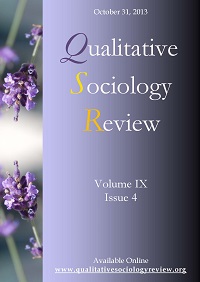An Empirical Analysis of the Structuration of American Ideologies About Economic Justice
DOI:
https://doi.org/10.18778/1733-8077.9.4.04Keywords:
Dominant Ideology, Structural Social Psychology, Inequality, Great Recession, Human Nature, Economic SociologyAbstract
A consensus has been forming among structural social psychologists that most Americans hold beliefs in both individualistic and structural explanations of inequality. Yet, even many who espouse structural beliefs nonetheless emphasize individual-level explanations of inequality to disproportionate extents. This study is aimed to identify common trends in the logic used by a conventional group of Americans – MBA students – to rationalize their more general political and economic beliefs. While a large number of studies have emphasized the prevalence of dominant ideology beliefs, and others have speculated theoretically on how such beliefs are reproduced, this study aims to bring these bodies of work together. I sought to build an initial understanding of how contradictions in Americans’ political and economic ideologies are transmuted, and to identify heuristic concepts fundamental to this process. Findings suggest that particular assumptions about human nature serve to “fill” the cognitive “gap” which would otherwise present individuals with insurmountable ambiguities in their ideologies about economic justice. Respondents also reflected some level of awareness of the impact of ideology on their thought processes, even as they accept such processes, and the realities they constitute, as inevitable.
Downloads
References
Della Fave, Richard L. 1974. “On the Structure of Egalitarianism.” Social Problems 22(2):199-213.
Google Scholar
DOI: https://doi.org/10.2307/799759
Edin, Katherine. 2000. “What do low income mothers say about marriage?” Social Problems 47(1):112-133.
Google Scholar
DOI: https://doi.org/10.1525/sp.2000.47.1.03x0282v
Feagin, Joe. 1972. “God Helps Those who Help Themselves.” Psychology Today 6:101-129.
Google Scholar
Feagin, Joe. 1975. Subordinating the Poor: Welfare and American Beliefs. Englewood Cliffs, NJ: Prentice-Hall.
Google Scholar
Frederick, William C. 2008. “The Business Schools’ Moral Dilemma.” Pp. 25-42 in Advancing Business Ethics Education Information, edited by Diane L. Swanson and Dann G. Fisher. Charlotte, NC: Age Publishing.
Google Scholar
Freeman, R. Edward and David Newkirk. 2008. “Business as a Human Enterprise: Implications for Education.” Pp. 131-148 in Rethinking Business Management: Examining the Foundations of Business Education, edited by Samuel Gregg and James R. Stoner, Jr. Princeton, NJ: Witherspoon Institute.
Google Scholar
Gans, Herbert J. 1995. The War against the Poor: The Underclass and Antipoverty Policy. New York: Basic Books.
Google Scholar
Giddens, Anthony. 1979. Central Problems in Social Theory: Action, Structure and Contradiction in Social Analysis. Berkeley, Los Angeles: University of California Press.
Google Scholar
Glaser, Barney. 1998. Doing Grounded Theory – Issues and Discussions. Mill Valley, CA: Sociology Press.
Google Scholar
Glaser, Barney and Anselm Strauss. 1967. The Discovery of Grounded Theory. Chicago: Aldine.
Google Scholar
Hebdige, Dick. 1979. Subculture: The Meaning of Style. New York: Methuen.
Google Scholar
Hochschild, Jennifer. 1981. What’s Fair? American Beliefs about Distributive Justice. Cambridge, London: Harvard University Press.
Google Scholar
Howard, Judith A. and Daniel G. Renfrow. 2003. “Social Cognition.” Pp. 259-281 in Handbook of Social Psychology, edited by John Delamater. New York: Kluwer Academic/Plenum Publishers.
Google Scholar
DOI: https://doi.org/10.1007/0-387-36921-X_11
Huber, Joan and William Form. 1973. Income and Ideology. New York: Free Press.
Google Scholar
Hunt, Matthew O. 1996. “The Individual, Society, or Both? A Comparison of Black, Latino, and White Beliefs about the Causes of Poverty.” Social Forces 75:293-332.
Google Scholar
DOI: https://doi.org/10.2307/2580766
Hunt, Matthew O. 2007. “African American, Hispanic, and White Beliefs about Black/White Inequality, 1977-2004.” American Sociological Review 72:390-415.
Google Scholar
DOI: https://doi.org/10.1177/000312240707200304
Jackman, Mary. 1994. The Velvet Glove: Paternalism and Conflict in Gender, Class, and Race Relations. Berkeley, CA: University of California Press.
Google Scholar
DOI: https://doi.org/10.1525/9780520337794
Kluegel, James R. and Eliot R. Smith. 1986. Beliefs about Inequality: Americans’ Views of What is and What Ought to Be. New York: Aldine de Gruyter.
Google Scholar
Martin, John Levi and Matthew Desmond. 2010. “Political Position and Social Knowledge.” Sociological Forum 25:1-26.
Google Scholar
DOI: https://doi.org/10.1111/j.1573-7861.2009.01154.x
McLeod, Jane. D. and Kathryn J. Lively. 2003. “Social Structure and Personality.” Pp. 77-102 in Handbook of Social Psychology, edited by John Delamater. New York: Kluwer Academic/Plenum Publishers.
Google Scholar
DOI: https://doi.org/10.1007/0-387-36921-X_4
Miles, Matthew B. and Michael A. Huberman. 1984. Qualitative Data Analysis: A Sourcebook of New Methods. Beverly Hills, CA: Sage.
Google Scholar
Rytina, John Huber, William H. Form, and John Pease. 1970. “Income and Stratification Ideology: Beliefs about the American Opportunity Structure.” The American Journal of Sociology 75(4):703-716.
Google Scholar
DOI: https://doi.org/10.1086/224897
Sallach, David L. 1974. “Class Domination and Ideological Hegemony.” The Sociological Quarterly 15(1):38-50.
Google Scholar
DOI: https://doi.org/10.1111/j.1533-8525.1974.tb02126.x
Strauss, Anselm and Juliet Corbin. 1990. Basics of Qualitative Research: Grounded Theory Procedures and Techniques. Newbury Park, CA: Sage.
Google Scholar
Downloads
Published
How to Cite
Issue
Section
License

This work is licensed under a Creative Commons Attribution-NonCommercial-NoDerivatives 4.0 International License.











